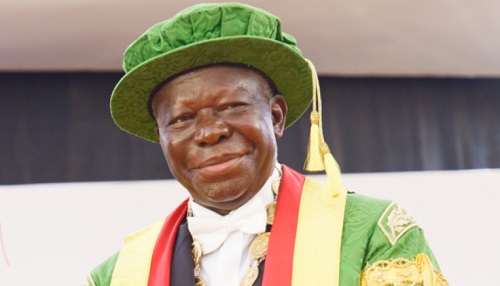Parliament on Friday night [Dec 22] approved five tax bills aimed at helping the government to rake in additional revenue to the state as well as the Appropriation Bill, 2023.
They are the Value Added Tax (Amendment) Bill, 2023, Excise Duty (Amendment) (No. 2) Bill, 2023, Stamp Duty (Amendment) Bill, 2023 Emissions Levy Bill, 2023 and Exemptions (Amendment) Bill, 2023.
First, the VAT Bill seeks to expand the tax net and extend the zero rate on locally manufactured products, introduce a zero rate on locally-produced sanitary towels and waive the VAT on the import of electric vehicles for public transportation.
It will also introduce a flat rate of five per cent for the rental of commercial premises and the sale of immovable property by an estate developer.
Set to amend the existing VAT regime, the bill is estimated to yield GH¢3.725 billion for the 2024 financial year, reports Graphic Online’s Nana Konadu Agyeman from Parliament House.
Second, the Excise Duty Bill is to amend the Excite Duty Act, 2015 (Act 878) to increase the excise duty rate on cider bear to align with the excise duty rate on beer, reduce excise duty on plastics and expand the coverage of the excise duty on plastics to cover imported plastic packaging.
It will also introduce an emission tax on carbon dioxide emissions by companies and from vehicles.
It is billed to yield approximately GH¢540 million in additional revenue to the state.
Third, the Stamp Duty (Amendment) Bill is to amend the Stamp Duty Act, 2005 (Act 689) to review the rates of stamp duty on specified instruments that have legal effect in line with current economic realities.
It is not a tax on transactions but on documents brought into being for the purpose of recording transactions.
The revision of the rates of stamp duty is expected to yield an amount of GH¢653 million in revenue for the 2024 financial year.
Fourth, the purpose of the Emissions Levy Bill is to promote the use of eco-friendly technologies and green energy.
Seeking to control the level of carbon dioxide emissions from internal combustion engine vehicles in Ghana, the bill will generate an amount of GH¢541 million for the 2024 fiscal year.
Fifth, the Exemptions (Amendment) Bill, 2023 is to provide a waiver of customs duties and customs taxes in respect of the importation of fishing gear and agricultural inputs.
The bill, waiver will result in estimated exemptions to the tune of GH¢442.65 million next year.
It will provide for the exemption from customs duties and customs taxes, seeds and fertilisers imported for agricultural purposes in relation to the phase two of the Planting for Food and Jobs Programme.
The Appropriation Bill provides for the withdrawal an amount of GH¢259 billion from the Consolidated Funa and other public funds necessary to meeting government expenditure for the 2024 financial year.
Rationale for taxes
Presenting the Finance Committee’s report on the four tax bills and moved a motion for the House to adopt the report, Kwaku Kwarteng, the Chairman of the committee, said the proposed amendments to the VAT Act were necessary to promote domestic production of sanitary towels and extend the coverage of VAT to other sector to enhance revenue generation.
He said the entire Minority members of the committee supported the zero-rating of VAT on materials for the production of sanitary towels but expressed concerns about the impact the other revenues measures would have on the cost of doing business in the country on the general population.
When a voice vote was put on the motion for the House to adopt the Finance Committee’s report on the bill, the Second Deputy Speaker,
Andrew Asiamah Amoako, who was presiding, declared the “Ayes” by the Majority to have had it.
But the Deputy Minority Leader, Emmanuel Armah-Buah, invoked Order 113(2) to challenge Mr Amoako’s decision.
When the Speaker of Parliament assumed the chair, he directed the Table Office to conduct a headcount which saw a 137 to 134 votes in favour of the Majority.
The Excise Duty Bill
For the Excise Duty (Amendment) (No. 2) Bill, Mr Kwarteng said the bill was targeted at reducing the negative impact of cider beer on consumers.
He said the inclusion of imported plastic packaging in the excise tax on plastics would reduce the incentive to import those products rather than sourcing them from local manufacturers.
“Again, the reduction of the rate of the tax from 10 per cent of ex-factory prices to five per cent of ex-factory price will bring some relief to local manufacturers who hitherto have had to pay the tax at the rate of 10 per cent of ex-factory price,” he said.
He said the entire Minority on the committee expressed concern about the impact those increases would have on the cost of doing business in the country and on the general population.
Stamp Duty bill
With regard to the Stamp Duty (Amendment) Bill, 2023, Mr Kwarteng said the bill would not affect any of the ad-valorem rates in Act 689.
The only rates being reviewed were the nominal amounts that were set in 2005 and which had lost their value over time, he said.
Just like previous bill, he said the entire Minority members declined to recommend to the House to pass the bill into law as it would worsen the economic situation of Ghanaians and businesses.
Importance of Emissions Levy Bill
On the importance of the Emissions Levy Bill, Mr Kwarteng said the ultimate effect is to reduce the adverse impact of pollution on the environment and reduce environmental pollution and encourage the use of clean energy,” he said.
On the position of the Minority on the bill, he said members of the NDC expressed their unwillingness to support the bill due to its potential to increase the cost of doing business in the country.
Source: GraphicOnline






